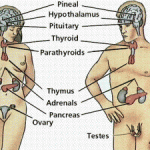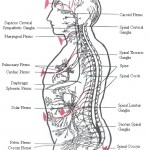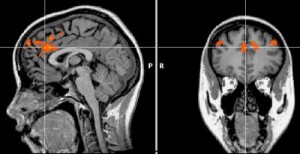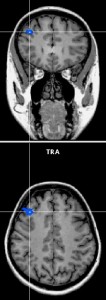We have Sankara exhorting us in Vivekachudamani: “The first step to Liberation is the extreme aversion to all perishable things, then follow calmness, self-control, forbearance, and the utter relinquishment of all work enjoined in the Scriptures.” And a little later he added: “He who is free from the terrible snare of the hankering after sense-objects, so very difficult to get rid of, is alone fit for Liberation, and none else even though he be versed in all the six Shastras.”
“Mind control is self-control,” said the highly revered Swami Krishnananda of Divine Life Society. And self-control is the way to awakening, he added.
Six passions of the mind called Arishadvargas were depicted as the internal enemies of the man on the path to attaining moksha (liberation). These correspond to the hormones produced at the six major nerve plexuses as shown in the figures 1 and 2 and Table 1.
Psychologist Piercarlo Valdesolo writes “The power to resist temptation has been extolled by philosophers, psychologists, teachers, coaches, and mothers.” And then he adds, “Of course, this assumes that our natural urges are a thing to be resisted – that there is a devil inside, luring you to cheat, offend, err, and annoy. New research has begun to question this assumption.”
Table 1. A Suggested Equivalence of the Arishadvargas, Passions, Chakras, Plexuses and Glands:
| Kama | Sex/Desire | Muladhara | Coccygeal | Gonads |
| Krodha | Fear/Anger | Svadhistana | Prostatic | Adrenalin |
| Lobha | Greed | Manipura | Solar | Pancreas |
| Moha | Infatuation | Anahata | Cardiac | Thymus |
| Mada | Pride | Visuddha | Laryngeal | Thyroid / Parathyroid |
| Matsarya | Jealousy | Ajna | Cavernous | Pituitary |
| Sahasrara | Pineal | Pineal (?) |
[Note: This Table was prepared by me in 2006 and needs revision. Suggestions for modification / improvement are most welcome.]
Drs. J. Greene and J. Paxton of The Harvard University say from the brain imaging studies that “what separates the well-behaved from the poorly-behaved might not be the ability to control your temptations but rather what kind of temptations you have.”
Clearly it is the quality of your natural urges that wins over your ability to control. For example see the recent headline news story of 5th Sept 2012: Maine Girl Returns Lost Money. The mother has to think but the little girl Abbie didn’t even wink before she acted.
The story goes on to say: Ask yourself honestly: You find a big wad of cash on the ground, there are no surveillance cameras in sight, and nobody is watching you, what do you do? Jennifer Jacobson, a stay-at-home mom in Maine, admits that she had to think about it for a minute when her eight-year-old discovered $4,000 on the sidewalk by a Sam’s Club. As for her daughter Abbie? “It never crossed her mind to keep it,” mom tells.
Don’t we have it from Bhagavad-Gita itself “prakritim yanti bhutani, nigrahah kim karishyati (the living beings follow their own innate nature. What can repression do?”
The Harvard scientists have proposed a ‘Will’ Hypothesis vs. ‘Grace’ Hypothesis. ‘Will’ requires effortful action whereas under ‘Grace’ things are done just naturally. If it is the former case, you have to control and resist with effort your temptation to keep the wallet and if it is the latter the urge itself isn’t there.
People with a problem in the right prefrontal cortex (behind the right forehead) will have difficulty in taking care of their own image in the society and they may act in ways detrimental to their reputation. In fact lab experiments show that low frequency repetitive transcranial magnetic stimulation on the right lateral prefrontal cortex diminishes our ability to control our urges. So blame the magnetic fields around (on the right side) in case your spouse caught you in that little temptation of yours for an extra donut!
We do not have to be specially proud of our ability to control our urges because we are human beings. All animal species follow more or less the same molecular mechanisms of self-control which depends very much on the glucose levels in the blood. The will power operates like a muscle. It can be strengthened by practice or fatigued by overuse. So do not hope to stick to strong determinations if you have an empty stomach. If you do, it can be at the cost of some other organs in your body.
Very recent work by Neuroscientist W. Hedgcock of Iowa University confirms that self-control is a finite source and gets exhausted by use.
He contests the metaphor of a muscle and says it is more like a pool. Once the waters are dried up, we can hardly keep the cool when a demand is made on the resource. The source gets recharged in time especially in a low conflict environment.
The anterior cingualte cortex recognizes a situation that demands self-control. It is the dorsolateral prefrontal cortex that actually manages self-control (see Figures 3 and 4).
Research shows that drugs like psilocybin weaken the control centers such as the medial prefrontal cortex in the brain. The less effective the control centers are, the more is the psychedelic experience of the individuals taking such drugs.
Scientists of the Georgia university demonstrated a couple of years ago that self-control is contagious. Seeing someone with good self-control or even thinking of such a person helps you in your self-control. No wonder the ancient Indian system promoted satsangatya and held personalities like “Maryada Purushottama Rama (Highly Well-Mannered Best of Men)” as worthy of constant remembrance (smaran). Moreover, thoughts about bad men will also influence your ability at self-control negatively. It is said that the effect is so powerful that “seeing the name of someone with good or bad self-control flashing on a screen for just 10 milliseconds changed the behavior of volunteers.” It is also reported that “watching a movie showing violent acts predisposes us to act violently. Even just listening to violent rhetoric makes us more inclined to be violent.”
Religions play an important role in reinforcing the basic cognitive processes of self-control and thereby help in establishing valuable and peaceful inter-relationships in the society.
It is found that the neuronal circuits responsible for self-control are very sensitive to stress. Even everyday stress can shut down the brain. The prefrontal cortex has a special status within the hierarchy of these circuits. The prefrontal cortex is highly evolved and bigger in human beings compared to other primates. It matures rather slowly compared to other brain areas and develops fully only after teenage years are completed. This explains why the adolescent years look so irresponsible to adults. Naturally then, the teaching methods too should differ depending on to whom the Non-dual teaching is being addressed – little lads of 7 – 10 years christened brahmacharis after a ceremonious initiation to Vedic teaching or fully grown up individuals who have seen the travails and tribulations of life. These findings give the rationale of the apparently contrasting teachings about the role of self-control for liberation we have cited at the beginning of the article. It is now appropriate to conclude the article with the words of Swami Krishnananda:
“We enter a new world altogether when we wake up from dream or sleep. The achievement called ‘waking up from sleep’ is not the result of an action. This is why Acharya Sankara tirelessly hammers upon the idea that liberation is not an action, and it cannot be achieved by any kind of action. The reason behind this extraordinary proclamation of his is that what is to be achieved is so intimately connected with us that any activity of our personality cannot touch it; and moksha is nothing but an awakening into a wider reality which is already planted in us and is not external to us.
“Not the greatest of virtuous deeds can make us fit to visualise the cosmic form, says the Bhagavad-Gita towards the end of the eleventh chapter. Whatever be the virtue that we do in this world, that would be unsuited and inadequate for this purpose. Na veda-yajnadhyayanair na danair na cha kriyabhir na tapobhir ugraih, evam rupah sakya aham nrloke (11.48): Even the most terrific form of ordinary austerity, even the breaking of our head through the greatest of philanthropic deeds and services in the world – all these put together cannot be adequate for the purpose.”





Ramesam! What a neat article.
“The will power operates like a muscle. It can be strengthened by practice or fatigued by overuse.”
I have verified this sentence in my life. If I try to use will power/determination/intense focus, there ARE limits and boundaries to it.
I’ve practiced martial arts, strength and conditioning exercises for decades. My own experience has taught me that I have to find a middle, moderate ground in my approach to those doings. I’ve gotten too extreme in the past, did way too much, then the opposite side of that coin would emerge–I’d just have to quit it all for awhile, was sick of doing it all, had burned out, as they say. ( I could also say this about “spiritual pursuits”!….too much reading, trying, meditating etc.)
The solution to this was to do short, intense exercise routines, about 20 to 25 minutes, 5 days a week AND to have variety in the exercises. IF I hit a point where I just don’t want to do it, then it’s okay NOT to do it for a few days. THEN I’m ready to get back to it until the next time I “just don’t want to do it” and then repeat the cycle.
So for me will/determination does not mean an extreme. It means that most of the time, usually, generally speaking, I’m committed to exercise AND I can not do it for short periods of time also.
And will, self-control do seem to be contagious. Being around people employing self control, having people as models who have self-control….those do seem to rub off on us….me, at least. That is maybe the reason for “heros”, individuals who embody some characteristic which we can bring forth in ourselves.
Thanks again for this article. It reinforces my own findings! Moderation in all things.
Best wishes,
SteveS
Thanks Steve.
You are absolutely right in your findings. Bhagavad-Gita and Gautam Buddha too do advise moderation in all activities including routine bodily requirements like food etc.
This reminds me the question that John of NDM asked me.
“NDM: What exercises can one do to wipe out their vAsanA-s? Do mantras, japa, meditation help at all? What would you suggest?
Ramesam Vemuri: Mantras, japa, meditation, etc. are all actions that help in the reduction of vacillations in a mind and are conducive towards the development of a focused mind. Pilgrimages, holy dips, rituals, donations, service etc. may help in the development of detachment and also free one from too narrow an outlook and loosen the vice grip of a belief system.
For a reasonably analytical, intelligent and disciplined mind with an above average I.Q., cultivation of any of such exercises is superficial, irrelevant and of no concern for attainment of Nirvana, IMHO. A balanced diet and limited exercise that can contribute to a healthy body-mind are more necessary so that Self-inquiry may proceed unimpeded by health problems…….”
(The Interview is available at: http://www.nondualitymagazine.org/nonduality_magazine.2,ramesamvemuri.htm )
I feel what is important is to maintain the body and mind in a fit enough condition to be able to pursue Self-inquiry undisturbed.
warm regards,
ramesam
(P.S.: This article was actually written by me after I sent out my response to Q 322. But I posted it before Dennis published the Q&A # 322. This PS is just to inform about the chronology).
This reminds me of a saying by a famous American cardiologist: “A vigorous five mile walk will do more good for an unhappy but otherwise healthy adult than all medicine and psychology in the world.” – Dr. Paul Dudley White